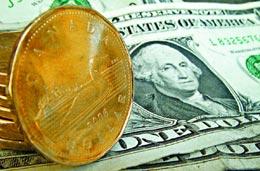Weaker loonie hurts more than it helps

Guest Commentary
Philip Cross
Fraser Institute
The negative impact of a weaker loonie will likely outweigh any benefits, says Philip Cross, former chief economic analyst for Statistics Canada, in his analysis published by the Fraser Institute.
Last week the Canadian dollar dropped below 90 cents US. Good news, say some economists, for the Canadian economy. Not so, says Cross, who writes a regular commentary for the Fraser Institute on pressing macroeconomic issues.
It’s a myth that devaluation of the Canadian dollar broadly stimulates the economy and leads to prosperity. In fact, a weaker loonie triggers higher domestic prices, which hit consumers in the wallet, and higher importing and financing costs, which hurt businesses and government.
For example, certain commodities—gasoline, for example—are priced in U.S. dollars. So when the loonie drops, people pay more at the pumps.
The cost of doing business will also increase. Canadian businesses import 55 per cent of their machinery and equipment. When faced with higher prices, businesses will buy less machinery and equipment, and consequently limit production, which may limit employment opportunities and hurt worker wages.
Canadian governments, meanwhile, will pay more when managing debt denominated in U.S. dollars, particularly provincial governments and their utilities (i.e. natural gas, electricity), which issue the most bonds denominated in non-Canadian currency.
However, there are benefits—albeit overstated, in some cases.
Exporters benefit from a lower exchange rate. Why? Because Canadian exporters exchange goods for U.S. dollars, so when the loonie is relatively low, those U.S. dollars, when repatriated, buy more Canadian dollars.
But even for exporters, the benefits of a lower exchange rate are likely to be limited, because market demand is the primary driver of exports—not the relative strength or weakness of the loonie.
Moreover, exporters may rely too heavily on a depreciating dollar, which can lead to investments that only make sense with a weaker loonie.
Canadian natural resource industries should benefit most from a lower Canadian dollar. Oil and gas firms, for example, export much more than they import, so a weaker loonie will boost their bottom line.
For individual Canadians, anyone invested abroad will pocket more Canadian dollars when those investments are brought back home.
But this is a dubious benefit to the Canadian economy because it rewards people for not investing in Canada, and consequently, lowers the value of all assets in the country.
In conclusion, the benefits of the lower exchange rate for the Canadian dollar are likely to be outweighed by the costs.
The benefit to manufacturers will be limited, since they have success fully adopted strategies to cope with the higher dollar over the past decade.
Natural resources are positioned to profit more from the lower dollar than manufacturing, when most resource industries already are enjoying buoyant condtions. Meanwhile, the lower dollar will boost some prices for consumers and businesses, and raise the financing costs of borrowers abroad.
Philip Cross worked for 36 years at Statistics Canada, the last few as its Chief Economic Analyst
Leave a comment









